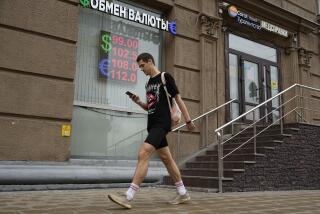RUSSIA : Out of Rubles? Use Scrip, Gum or Matches : Cash-short cities, plants print their own currency. In-kind payments foster barter system.
- Share via
NIZHNY NOVGOROD, Russia — The money crisis started slowly in this ancient city set on the steep wooded banks of the Volga River.
In May, factory directors announced they didn’t have enough cash to pay workers. After months of postponed paydays, people complained that they didn’t have enough money to buy food. Soon afterward, store managers began to worry aloud that they wouldn’t have enough rubles to pay their suppliers.
Ever so painfully, the economy was grinding to a halt, for want of legal tender to buy and sell.
So regional authorities stepped in, deciding to print their own cash for use in stores in the Nizhny Novgorod area.
Similar tales could be told across the Commonwealth of Independent States as skyrocketing inflation has made the price of consumer goods balloon by 100 times and more, wiping out personal and institutional savings and creating a continent-wide cash shortage.
In Russia, a country without an established credit-card or checking system, where transfers from one bank account to another can take weeks and endless bureaucratic hassles, almost everyone relies on cash--or used to.
The Central Bank recently estimated that Russia’s cash deficit will soar to 66 billion rubles ($330 million at the prevailing rate) by the end of 1992.
To avoid being sucked into this monetary black hole, industries ranging from nuclear power plants to machine-building factories have issued their own bank notes, often decorated with portraits of local managers instead of Lenin’s profile.
Typically, such scrip is valid only in company-owned shops--a practice that stunts Russia’s emerging free market and transforms each industry into an insulated enclave.
Yet despite its limited purchasing power, workers are grateful to be receiving cash, even of the makeshift variety. After all, they figure, an envelope of locally accepted bank notes is better than a bundle of plywood, which is what workers in a Ural Mountain timber-processing plant now get on payday, or the armfuls of matches paid to employees of a match factory.
Such in-kind payments, devised by managers of cash-strapped factories to meet the payroll, are mushrooming into a widespread barter system.
With small bills and coins in especially short supply, some stores now give sticks of gum or metro tokens as change. A recycling plant pays for returned bottles with packets of sugar and detergent.
In one northern Russian city, government stores now give soldiers condoms instead of change. (Civilians get candy or bus tickets). In another town, residents reportedly have started to receive part of their pay in eggs.
The small-bills deficit is so severe that when retirees in the central Volga city of Samara received 5,000-ruble notes as pension payments last month--one bill for every three people--store clerks refused to accept the notes, saying they did not have enough change.
The Russian government has tried to ease the cash crunch by ordering more money printed and new 1-, 5- and 10-ruble coins minted. President Boris N. Yeltsin has also tried to maximize the amount of money in circulation, ordering stores to empty their cash registers every day and immediately deposit the receipts in the bank.
Despite such measures, Nizhny Novgorod, a city of 2 million people that was called Gorky in the Soviet period, grew so short of cash this summer that regional administrators spent more than 20 million bona fide Russian rubles (about $100,000) to print colorful bank notes in six denominations.
The region was just about to issue this scrip, featuring a drawing of this city’s 16th-Century fortress, when Moscow intervened, dispatching crates of 5,000-ruble notes here to cover the 4-billion ruble ($20-million) debt that factories owed their workers, many of whom had not been paid for months.
“It might look like blackmail,” Deputy Governor Yevgeny Gorkov said with a sly smile. “As soon as the Central Bank heard about our plans, the region received a substantial amount of the money it needed.”
RUBLE HITS NEW LOW: Russian currency loses 20% of its value against the dollar. D4
More to Read
Sign up for Essential California
The most important California stories and recommendations in your inbox every morning.
You may occasionally receive promotional content from the Los Angeles Times.










